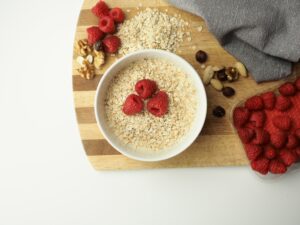Consuming enough fiber every day provides multiple health benefits throughout the body. Fiber is present in a lot of the nutrient-dense foods we eat. You may have not even realized what role fiber plays in keeping you healthy!
Normally, the body breaks down carbohydrates into sugar that our bodies use for fuel. Fiber is a carbohydrate that our bodies do not use as a source of fuel. Instead, fiber moves throughout the digestive system and supports many of our biological processes!
Fiber plays a key role in:
- Bowel health and movements
- Controlling cholesterol and blood sugar levels
- Maintaining a healthy weight
Consuming enough fiber throughout the day is important to meet our daily needs. Dietary fiber content can be found in grams on the nutrition facts panel of packaged foods such as grains, legumes, nuts, and seeds. A quick google search can give you estimates of grams of fiber for foods that do not have nutrition facts panels such as fresh fruits and vegetables.
Daily Fiber recommendations:
- Men (50 or younger) need 38 grams
- Men (51 or older) need 30 grams
- Women (50 or younger) need 25 grams
- Women (51 or older) need 21 grams
Daily fiber needs can be met through eating a well-balanced diet. Fiber-rich foods include fruits, vegetables, grains, legumes, nuts, and seeds. You can obtain the most fiber content from fruit and vegetables when the skin/peel is left on. The skin of fruits and vegetables contains important components that provide fiber, antioxidants, vitamins, and minerals. There are different ways to prepare your fruits and vegetables if you are someone who doesn’t prefer the skin or peel, such as:
- Blending the fruit or vegetables
- Chopping the fruit or vegetables into finer pieces
- Spiralizing your vegetables
- Incorporating frozen fruits
There are two different types of fiber that both provide distinct health benefits: Soluble fiber and Insoluble fiber. Eating a well-balanced diet of fruits, vegetables, legumes, whole grains, nuts, and seeds will provide you with appropriate amounts of both forms of fiber.
Soluble fiber
- Dissolves in water to create a beneficial gel substance that regulates digestion
- Controls cholesterol and blood sugar levels
- Aids in constipation and diarrhea
- Makes you feel full for longer
- Helps maintain a healthy gut
Insoluble fiber
- Does not dissolve in water to add bulk to stools
- Promotes regular bowel movements
- Aids in constipation
- Makes you feel full for longer
Obtaining your daily fiber from a well-balanced diet is the gold standard. Eating fiber-rich foods helps you to feel full for longer. Meals that provide a feeling of fullness are beneficial to individuals looking to obtain their desired healthy weight. Fiber supplements do not provide the same level of fullness which makes them less effective for individuals looking to maintain a healthy weight.
Staying hydrated is important for overall health but is especially important for fiber as the two work hand-in-hand. If you are hitting your fiber goals for the day and aren’t achieving the results you are looking for, make sure you are not chronically dehydrated. Try to space your water consumption evenly throughout the day and monitor urine color for levels of hydration.
 An example of a fiber-dense breakfast and snack:
An example of a fiber-dense breakfast and snack:
Breakfast: ½ cup cooked Oatmeal (4g fiber), 2 Tablespoons Peanut butter (3g fiber), ½ cup Raspberries (4g fiber)
Total (11g fiber)
Snack: 1 medium Apple (4g fiber), 2 Tablespoons Peanut butter (3g fiber)
Total (7g fiber)
Written by: Danielle Baldizzi
Resources
https://health.clevelandclinic.org/whats-the-difference-between-soluble-and-insoluble-fiber/
https://www.mayoclinic.org/healthy-lifestyle/nutrition-and-healthy-eating/in-depth/fiber/art-20043983#:~:text=Dietary%20fiber%20increases%20the%20weight,Helps%20maintain%20bowel%20health.
https://www.goodrx.com/well-being/diet-nutrition/soluble-vs-insoluble-fiber
https://www.hsph.harvard.edu/nutritionsource/carbohydrates/fiber/